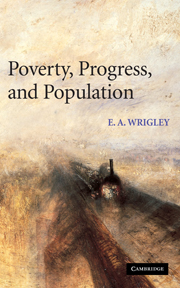Book contents
- Frontmatter
- Contents
- List of figures
- List of tables
- Acknowledgements
- Introduction
- PART I The wellsprings of growth
- 1 The quest for the industrial revolution
- 2 The divergence of England: the growth of the English economy in the seventeenth and eighteenth centuries
- 3 Two kinds of capitalism, two kinds of growth
- 4 Men on the land and men in the countryside: employment in agriculture in early nineteenth-century England
- 5 The occupational structure of England in the mid-nineteenth century
- 6 Corn and crisis: Malthus on the high price of provisions
- 7 Why poverty was inevitable in traditional societies
- 8 Malthus on the prospects for the labouring poor
- PART II Town and country
- PART III The numbers game
- Bibliography
- Index
6 - Corn and crisis: Malthus on the high price of provisions
Published online by Cambridge University Press: 23 December 2009
- Frontmatter
- Contents
- List of figures
- List of tables
- Acknowledgements
- Introduction
- PART I The wellsprings of growth
- 1 The quest for the industrial revolution
- 2 The divergence of England: the growth of the English economy in the seventeenth and eighteenth centuries
- 3 Two kinds of capitalism, two kinds of growth
- 4 Men on the land and men in the countryside: employment in agriculture in early nineteenth-century England
- 5 The occupational structure of England in the mid-nineteenth century
- 6 Corn and crisis: Malthus on the high price of provisions
- 7 Why poverty was inevitable in traditional societies
- 8 Malthus on the prospects for the labouring poor
- PART II Town and country
- PART III The numbers game
- Bibliography
- Index
Summary
The OED gives the following base definition of the word dearth: ‘dearness, costliness, high price’, though cautiously noting ‘This sense, though etymologically the source of those that follow, is not exemplified very early, and not frequent.’ It goes on to offer other usages: ‘A condition in which food is scarce and dear; often, in earlier use, a time of scarcity with its accompanying privations, a famine’ and ‘scarcity of anything, material or immaterial’. That there should be a link between high prices and food shortage is entirely natural given the nature of all pre-industrial economies, and therefore that the same word should have come to assume the range of meanings defined in the OED is not surprising. Yet achieving an effective understanding of some aspects of the nature of the relationship between the two has proved surprisingly elusive, given the central importance of the harvest in all economies until the recent past.
Of the four necessities of life recognised by the classical economists, food, shelter, clothing, and fuel, the first was by far the most important. Amongst the poor three-quarters or more of all income might have to be devoted to food even in normal times, and in most European economies the great bulk of this expenditure went on bread grain. Little wonder, therefore, that the bounty or otherwise of the last harvest, which, together with the scale of any carryover from earlier years, determined current supply, and the prospects for the next harvest, which began to affect the price of grain many months before any corn was cut, were matters of such pressing concern to individuals, to communities, and to governments.
- Type
- Chapter
- Information
- Poverty, Progress, and Population , pp. 204 - 211Publisher: Cambridge University PressPrint publication year: 2004



